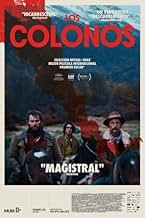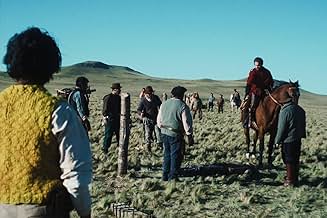PUNTUACIÓN EN IMDb
6,9/10
6,2 mil
TU PUNTUACIÓN
Un chileno mestizo, viaja hacia el sur en una expedición liderada por MacLenan, un ex capitán inglés de la Guerra de los Bóers y Bill, un mercenario estadounidense, para cercar un terreno co... Leer todoUn chileno mestizo, viaja hacia el sur en una expedición liderada por MacLenan, un ex capitán inglés de la Guerra de los Bóers y Bill, un mercenario estadounidense, para cercar un terreno concedido al terrateniente español José Menéndez.Un chileno mestizo, viaja hacia el sur en una expedición liderada por MacLenan, un ex capitán inglés de la Guerra de los Bóers y Bill, un mercenario estadounidense, para cercar un terreno concedido al terrateniente español José Menéndez.
- Dirección
- Guión
- Reparto principal
- Premios
- 17 premios y 27 nominaciones en total
Mishell Guaña
- Kiepja
- (as Mishell Guaña Montoya)
Reseñas destacadas
The film is not bad, but the poverty and suffering of a people and natives are shown in a very gentle way and everything seems poetic, without any particular fervor. I gave 7, because of the other things, especially because of photography, but all together it is less than 7. Why? Mostly because of American-English cast. They are more for a TV show than for the big screen of the cinema. Given that this is Galvez's debut, it must be noted that he really committed to being as faithful as possible to the depiction of his country's history, not too aggressive, but still quite poetically mild. In any case, the cruel and murderous attitude of the colonists towards the natives was shown.
I did not know anything about this parrt of Chile history. This movie begins like a western, with a scheme rather close to TOM HORN, where it is impossible to say who is the good character and who is the villain. This amazing film is not destined to wide audiences, as you can guess, and it is quite painful, depressing, disturbing, but so close to actual facts. I really loved this picture, a so amazing, lesson of history. It definitely deserved to be told. It is rough, gritty, and divided in two parts actually. That's exactly the kind of film that I search for from Latin America or Us or European indie film industries.
Watching The Settlers is a grueling, almost physical challenge. Some of the scenes are so disturbing, and presented with such unflinching realism, that it is impossible not to look away at times.
The presentation of the horror of the genocide in Chile, and the appalling treatment of the indigenous people, at the turn of the last century is depicted in a way that is moving in a all of the ways that Killing of the Flower Amon wanted to be (and simply wasn't).
All of the performances are fantastic, especially the Indian natives, whose traumatized and quiet demeanors seems to drive home the atrocities being inflicted on them.
The Horror!
The presentation of the horror of the genocide in Chile, and the appalling treatment of the indigenous people, at the turn of the last century is depicted in a way that is moving in a all of the ways that Killing of the Flower Amon wanted to be (and simply wasn't).
All of the performances are fantastic, especially the Indian natives, whose traumatized and quiet demeanors seems to drive home the atrocities being inflicted on them.
The Horror!
10futuberg
First of all, there are some people here who have absolutely no idea about any Chilean history. This particular story is not real, but everything you see in the movie did happen, and more, muuuuch more. I am Chilean, or British and Native descent, and I have read on the topic extensively. What European settlers did in Patagonia will blow anyone's mind and this movie is a bit of refreshing justice on a world who chooses to forget. A must watch if you have the guts to face your ancestors history. Not a film for cowards.
I recommend anyone who wants to really know what Europeans did to google a little about it, and you'll find plenty about the Selknam, Alacalufe, Onas, Yaganes and many others who perished to feed and clothe the Europeans of the 19th and 20th century. PS: some wrote that is about the foundation of Chile, which is incorrect. The facts on this movie are hundreds of years after that.
I recommend anyone who wants to really know what Europeans did to google a little about it, and you'll find plenty about the Selknam, Alacalufe, Onas, Yaganes and many others who perished to feed and clothe the Europeans of the 19th and 20th century. PS: some wrote that is about the foundation of Chile, which is incorrect. The facts on this movie are hundreds of years after that.
"Los colonos" (aka "The Settlers") is an international production with a solid screenplay and measured directing by Felipe Gálvez Haberle. It may not be the best film of 2023, yet it deservedly won several international awards and is a haunting social commentary on colonialism to raise consciousness with an artistic flair. You would be hard pressed to find a more impactful movie in the last few years about indigenous atrocities. Even Martin Scorsese's superior "Killers of the Flower Moon" fails to express so viscerally and intellectually the lingering injustice and the inherent flaws of the system that prevails to this day.
The recent trend to, only when confronted, publicly acknowledge aspects of the world's most horrific genocide and culturicide in recorded history still lacks real solutions, salvation and changes necessary to avoid these types of atrocities in this new century. We are still faced with largely sanitised native history with selected omissions or distortions making there way to the classrooms and overall culture. Many think natives died of disease because of weaker or unprepared immune system and long time ago. This film shows 20th century history way after massacres like the Bloody River in St. Kitts, where roughly 2000 Kalinago natives were massacred by British and French forces in an unlikely alliance in the 17th century. We also now know that tens of thousands of native children were taken from their parents for "reducation" in Canada and hundreds massacred in a system that was active as late as 1996!
"Los colonos" forces us to look at our collective colonial past and present. The editing is poignant and the sudden switch in the narrative to a future with a more benevolent and supposedly peace-seeking politician, after the fact, to salvage the reputation of the government, inquire, blame and benefit is sublime. Doctrines of violence or pacification with docile "allies have always had the same aim: to solve the troublesome "problem of the savages on their ancestral land" that the colonisers claimed and simply took. This film's depiction (and deception) is marked with nuances and relates to current climate of "truth, reconciliation and inclusion" which has to date failed to produce tangible or real results.
Felipe Gálvez Haberle said in an interview that the history of cinema is also stained with blood in terms of what has been shown and how. Here, he examines this systemic colonial mindset that seeps into every aspect of our lives without much afterthought or questioning. He uses a 4:3 aspect ratio that is much less gimmicky than Bradley Cooper's "Maestro" and more aimed at providing a claustrophobic and time-capsule atmosphere, like perhaps the beautiful "The Lighthouse" from Robert Eggers in another genre of movie-making. Haberle and cinematographer Simone D'Arcangelo still manage to capture breathtaking Patagonia scenery along with some intimate interior shots and more graphic gut-wrenching scenes. It is not however overly graphic and let's the dialogue and unsaid or unseen events creep into the viewers mind as the story unfolds and is expertly exposed with a few satisfying and surprising twists.
A must-see for cinephiles, teachers and school children!
(8/10)
The recent trend to, only when confronted, publicly acknowledge aspects of the world's most horrific genocide and culturicide in recorded history still lacks real solutions, salvation and changes necessary to avoid these types of atrocities in this new century. We are still faced with largely sanitised native history with selected omissions or distortions making there way to the classrooms and overall culture. Many think natives died of disease because of weaker or unprepared immune system and long time ago. This film shows 20th century history way after massacres like the Bloody River in St. Kitts, where roughly 2000 Kalinago natives were massacred by British and French forces in an unlikely alliance in the 17th century. We also now know that tens of thousands of native children were taken from their parents for "reducation" in Canada and hundreds massacred in a system that was active as late as 1996!
"Los colonos" forces us to look at our collective colonial past and present. The editing is poignant and the sudden switch in the narrative to a future with a more benevolent and supposedly peace-seeking politician, after the fact, to salvage the reputation of the government, inquire, blame and benefit is sublime. Doctrines of violence or pacification with docile "allies have always had the same aim: to solve the troublesome "problem of the savages on their ancestral land" that the colonisers claimed and simply took. This film's depiction (and deception) is marked with nuances and relates to current climate of "truth, reconciliation and inclusion" which has to date failed to produce tangible or real results.
Felipe Gálvez Haberle said in an interview that the history of cinema is also stained with blood in terms of what has been shown and how. Here, he examines this systemic colonial mindset that seeps into every aspect of our lives without much afterthought or questioning. He uses a 4:3 aspect ratio that is much less gimmicky than Bradley Cooper's "Maestro" and more aimed at providing a claustrophobic and time-capsule atmosphere, like perhaps the beautiful "The Lighthouse" from Robert Eggers in another genre of movie-making. Haberle and cinematographer Simone D'Arcangelo still manage to capture breathtaking Patagonia scenery along with some intimate interior shots and more graphic gut-wrenching scenes. It is not however overly graphic and let's the dialogue and unsaid or unseen events creep into the viewers mind as the story unfolds and is expertly exposed with a few satisfying and surprising twists.
A must-see for cinephiles, teachers and school children!
(8/10)
¿Sabías que...?
- CuriosidadesOfficial submission of Chile for the 'Best International Feature Film' category of the 96th Academy Awards in 2024.
- ConexionesReferenced in Radio Dolin: Oscars 2024: The Best Films from around the World (2023)
- Banda sonoraAll the Pretty Horses
Arranged by Harry Allouche
Performed by Adriana Stuven (as Adri Stuven) and Kinga Csapo
Piano by Harry Allouche
Selecciones populares
Inicia sesión para calificar y añadir a tu lista para recibir recomendaciones personalizadas
- How long is The Settlers?Con tecnología de Alexa
Detalles
- Fecha de lanzamiento
- Países de origen
- Idiomas
- Títulos en diferentes países
- The Settlers
- Localizaciones del rodaje
- Empresas productoras
- Ver más compañías en los créditos en IMDbPro
Taquilla
- Recaudación en Estados Unidos y Canadá
- 46.035 US$
- Fin de semana de estreno en EE. UU. y Canadá
- 8210 US$
- 14 ene 2024
- Recaudación en todo el mundo
- 113.466 US$
- Duración
- 1h 37min(97 min)
- Relación de aspecto
- 1.50 : 1
Contribuir a esta página
Sugerir un cambio o añadir el contenido que falta






























